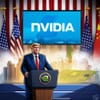Donald Trump declared that the most advanced AI chips produced by Nvidia, specifically the “Blackwell” series, will be reserved only for U.S. companies and will not be sold to China or “other people.” He emphasized that although Nvidia might still “deal” with foreign customers, the purchases cannot involve the very highest-end hardware.
This announcement signals a tightening of export control policy beyond what had been publicly discussed. While previous U.S. rules prohibited direct sales of cutting-edge chips to China, Trump’s remarks suggest a broader restriction — effectively keeping the top tier of artificial-intelligence hardware within U.S. hands alone. The move comes amid concerns that advanced AI hardware could bolster foreign adversaries’ military or economic capabilities.
The implications are significant for Nvidia itself, the global AI ecosystem, and international technology supply chains. For Nvidia, denying its most powerful chips to the world’s second-largest AI market (China) may dent revenue and strategic positioning. Meanwhile, for global AI development, the policy may force China and other nations to accelerate indigenous chip development or seek alternate supply chains. Analysts warn that restricting hardware access may inadvertently catalyse foreign innovation rather than suppress it.
In short, the U.S. is signalling that in its view, leadership in AI is no longer just about software or research — it now hinges on controlling access to the most advanced hardware. How foreign governments, chipmakers and global AI firms respond could reshape technological geopolitics for years to come.


